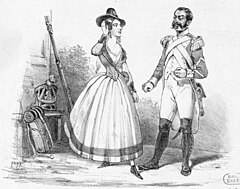La fille du régiment
| La fille du régiment | |
|---|---|
| Opéra comique by Gaetano Donizetti | |

Juliette Borghèse as Marie and François-Louis Henry as Sulpice in the premiere
|
|
| Librettist | |
| Language | French |
| Premiere | 11 February 1840 Salle de la Bourse, Paris |
La fille du régiment (The Daughter of the Regiment) is an opéra comique in two acts by Gaetano Donizetti, set to a French libretto by Jules-Henri Vernoy de Saint-Georges and Jean-François Bayard. It was first performed on 11 February 1840 by the Paris Opéra-Comique at the Salle de la Bourse.
The opera was written by Donizetti while he was living in Paris between 1838 and 1840 preparing a revised version of his then-unperformed Italian opera, Poliuto as Les martyrs for the Paris Opéra. Since Martyrs was delayed, the composer had time to write the music for La fille, his first opera set to a French text, as well as to stage the French version of Lucia di Lammermoor as Lucie de Lammermoor
As La fille, it quickly became a popular success, partly because of the famous aria "Ah! mes amis, quel jour de fête!", which requires of the tenor no fewer than nine high Cs. La figlia del reggimento, a slightly different Italian-language version (in translation by Calisto Bassi), was adapted to the tastes of the Italian public.
The opening night was "a barely averted disaster." Apparently the lead tenor was frequently off pitch. The noted French tenor Gilbert Duprez, who was present, later observed in his Souvenirs d'un chanteur: "Donizetti often swore to me how his self-esteem as a composer had suffered in Paris. He was never treated there according to his merits. I myself saw the unsuccess, almost the collapse, of La fille du régiment."
It received a highly negative review from the French critic and composer Hector Berlioz (Journal des débats, 16 February 1840), who claimed it could not be taken seriously by either the public or its composer, although Berlioz did concede that some of the music, "the little waltz that serves as the entr'acte and the trio dialogué ... lack neither vivacity nor freshness." The source of Berlioz's hostility is revealed later in his review:
...
Wikipedia
